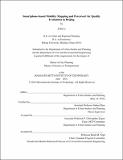Smartphone-based mobility mapping and Perceived Air Quality evaluation in Beijing
Author(s)
Li, Zelin, M.C.P. Massachusetts Institute of Technology
DownloadFull printable version (16.55Mb)
Alternative title
Smartphone-based mobility mapping and PAQ evaluation in Beijing
Other Contributors
Massachusetts Institute of Technology. Department of Urban Studies and Planning.
Advisor
Jinhua Zhao.
Terms of use
Metadata
Show full item recordAbstract
Recently, the rapid development of smartphone technologies has brought new opportunities for the citizen travel survey. Based on a survey performed using a smartphone app, Moves, in Beijing, China, this thesis discusses the survey design and implementation process as well as the mobility analysis methods. The survey was launched in January 2016. This thesis is based on data from 258 subjects. The air quality is monitored through several objective measures. However, citizens' subjective feelings have rarely been investigated. This thesis develops the Perceived Air Quality (PAQ) measure that captures the sensory reactions to air pollution. The PAQ data are collected through questionnaires, which are part of the travel survey. A strong correlation is found between daily average PAQ and AQI, indicating that the PAQ could become a meaningful indicator for air quality. However, the strong correlation only exists in the aggregated level. Finally, the thesis evaluates the association between travel behavior and air quality. Travel behavior is measured by number of trips, number of non-motorized trips, percentage of non-motorized trips, total distance traveled and total travel time. The air quality is measured by AQI and PAQ. The Random Effect regression models show that the association between travel behavior and air quality is pretty weak. It indicates that currently not many Beijing residents are taking air quality as a crucial factor when making travel decisions.
Description
Thesis: M.C.P., Massachusetts Institute of Technology, Department of Urban Studies and Planning, 2016. This electronic version was submitted by the student author. The certified thesis is available in the Institute Archives and Special Collections. Cataloged from student-submitted PDF version of thesis. Includes bibliographical references (pages 117-119).
Date issued
2016Department
Massachusetts Institute of Technology. Department of Urban Studies and PlanningPublisher
Massachusetts Institute of Technology
Keywords
Urban Studies and Planning.